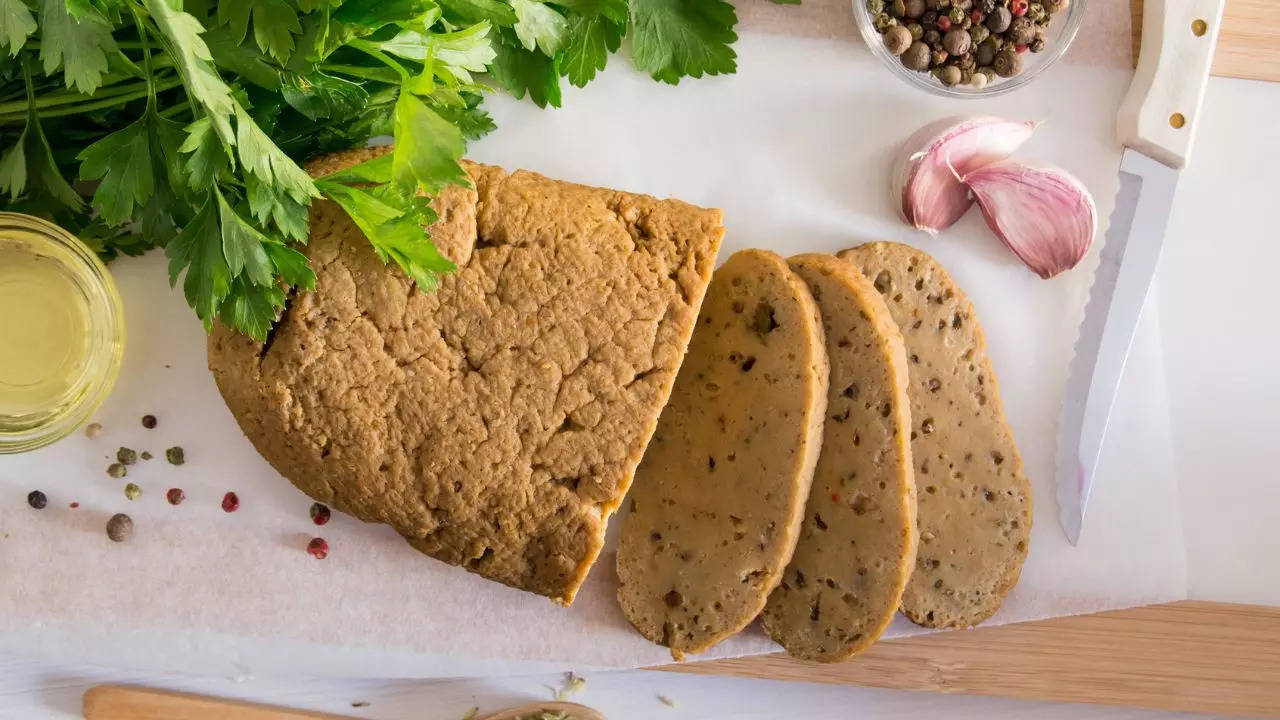Table of Contents

Social media has been blowing up with talk of a wheat and water ‘chicken’ – a high protein vegan meat substitute that’s got everyone curious. The process of stretching, kneading and rinsing in stages results in a cohesive dough that can be sliced, shredded or fried, just like chicken (though of course completely meat free). This concept is essentially a similar take on an age-old ingredient, Seitan which originated thousands of years ago in China.
What Is Seitan?
Seitan (and yes its pronounced ‘say-tan’, no relation to the prince of hell) is a popular vegan meat substitute made from hydrated gluten, the primary protein in wheat. Also known as wheat gluten, wheat meat, or simply gluten, seitan is created by kneading wheat flour with water to form gluten strands. The dough is then rinsed to remove starch, leaving behind pure gluten, which can be seasoned, cooked, and used in place of meat in vegan and vegetarian recipes.
History Of Seitan
While it may be a new craze and leans perfectly into the vegan meat trends, Seitan is definitely not a new creation in the culinary world, in fact, it dates back centuries. It can be traced back as far as Buddhist monks who originally referred to it as "mock duck," "mock goose," or "Buddha's food," and created it as a meat-free option to align with Buddhist diets.
The earliest records of seitan-like recipes date back to the 6th century in China, where wheat gluten was called "mian jin," meaning "wheat tendon" or "wheat muscle". Over time, seitan made its way to Japan, where it became an important part of Buddhist temple cuisine, known as Shojin Ryori. The term "seitan" itself is quite new in comparison to the concept and was only introduced in Japan in the 1960s as part of the macrobiotic diet.
Benefits Of Seitan
Though very simple in concept, Seitan is loved for its high nutritional content as well as its texture and ability to take on flavours. This often makes it a more popular vegan meat option than ingredients like tofu which often don’t mimic the meat texture very well. However, seitan is unsuitable for individuals with gluten sensitivity or celiac disease, as it is made from wheat gluten.
If you’re interested in experimenting with the magic of seitan, here’s an easy recipe to try out.
Homemade Seitan Recipe
Ingredients
For the Dough:
- 6 cups Whole Wheat Flour
- 2 cups Cold Water
For the Broth:
- 4 cups Water
- ¼ cup Soy Sauce or Braggs Liquid Aminos
- ½ Onion, chopped
- 1 tbsp Miso Paste
- 1 Medium Tomato, quartered
- 2 cloves Garlic
Method
- Combine the whole wheat flour and cold water in a bowl, mixing until a stiff, cohesive dough forms. If available, use a dough hook and a stand mixer for easier mixing.
- Shape the dough into a ball, place it in a bowl, and cover with cold water. Let it stand for 4 to 8 hours.
- Knead the dough under cold water, rinsing repeatedly until the water runs clear (about 10 minutes). Squeeze the dough to remove excess water and air.
- Cut the gluten into bite-sized pieces using a sharp knife or a bench scraper.
- In a large pot, combine all the broth ingredients (or use your preferred vegetable stock) and bring to a boil.
- Drop the gluten pieces into the boiling broth and bring back to a boil. Reduce the heat to a simmer, cooking the seitan for about 30 minutes. Turn the gluten pieces occasionally. Cook until most of the broth is absorbed and reduced. Discard the onion and tomato pieces.
- To use the seitan immediately, drain the pieces and sauté them in a little oil.
- To store, cover the seitan with broth and refrigerate for up to a week or freeze. If desired, thicken and reduce the remaining broth to use as a gravy.

